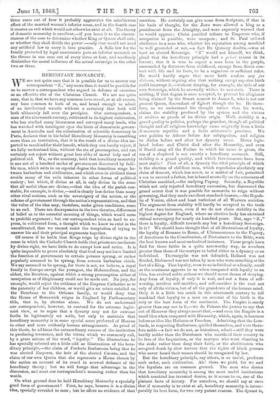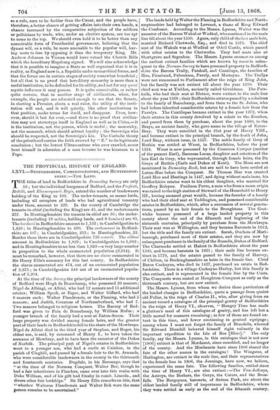HEREDITARY MONARCHY.
WE are not quite sure that it is possible for us to answer our correspondent "Z.," any more than it would be possible for us to answer a correspondent who argued in defence of exorcism as an effective rite of the Christian Church. We are not quite -sure, that is, that we have any common locus siandi, or at all events, any base common to both of us, and broad enough to admit of an intellectual wrestle without a certainty that both will both ultimately fall over the precipice. Our correspondent, a man of the nineteenth century, cultivated in its highest cultivation, -who has studied many literatures and surveyed many lands, who has watched with intelligent eyes the birth of democratic govern- ment in Australia and the culmination of scientific democracy in
Paris, declares that in his belief Hereditary Monarchy is something more than an institution, that it is the result of a divine idea im- parted to mankind for their benefit, which they can hardly reject, if we fully understand him, without the sin of presumption, and can -certainly not reject without great loss alike of moral help and of political aid. We, on the contrary, hold that hereditary monarchy is one out of a hundred modes of government discovered by falli- ble men, which suits in an especial degree the transition stage be- - tween barbarism and civilization, and which even in civilized times _avoids many of the evils inherent in other forms of political -society ; but which, if divine at all, is only divine in the sense that all useful ideas are divine,—that the idea of the parish con- -stable, for example, is diviue,—and is clearly less divine than many -other rival notions, such as the sovereignty of the nation, or the -scheme of government through the nation's representatives, and that the value of the idea may, therefore, under given conditions, come to an end. There are discrepancies in the two theories, differences -of belief as to the essential meaning of things, which would seem to prohibit argument ; but our correspondent tries so hard to ex- presa, in cultivated form, a thought which we know to exist in the uncultivated, that we cannot resist the temptation of trying to -answer his and their principal arguments together.
Of course if he holds that Kings reign by divine right in the
-sense in which the Catholic Church holds that priests are mediators by divine right, we have little to do except bow and retire. It is ,quite impossible to prove absolutely that God may not have limited the function of government to certain persons sprung, or rather popularly assumed to be sprung, from certain barbarian chiefs. We say assumed to be sprung, for there is not, we believe, a royal family in Europe except the youngest, the Hohenzollern, and the -oldest, the Bourbon, against which a strong presumption either of -usurpation or of illegitimacy could not be made out. No jury, for example, would reject the evidence of the Empress Catherine as to the paternity of her children, or would give an estate entailed on the Bourbons to the Orleans family, or would deny that the House of Brunswick reigns in England by Parliamentary title, that is, by election alone. We do not understand -our correspondent, however, to contend for the extreme legiti- mist view, or to argue that a dynasty may not for extreme iaults be legitimately set aside, but only to maintain that hereditary monarchy is in some special sense preferred of Heaven -to other and more evidently human arrangements. As proof of this thesis, he adduces the extraordinary success of the institution in producing reverence, and the virtue whicls we commonly call, by a gross misuse of the word, "loyalty." The illustrations he has specially selected are a little odd as illustrations of the here- ditary principle,—the claim of Frederic Barbarossa being that he was elected Emperor, the heir of the elected Czsars, and the claim of our own Queen that she represents a House chosen by the nation on account of its creed in avowed defiance of the hereditary theory ; but we will forego that advantage in the discussion, and meet our correspondent's meaning rather than his words.
On what ground does he hold Hereditary Monarchy a specially good form of government? First, he says, because it is a divine idea, specially revealed to man ; but he offers no evidence of that assertion. He certainly can give none from Scripture, if that is his basis of thought, for the Jews were allowed a king as a punishment from the Almighty, and were expressly warned that he would oppress ; Christ justified tribute to Emperors who, if usurpation is possible, were usurpers ; and St. Paul ordered obedience to a man who, whether his reputation among mankind be well grounded or not,—a fact De Quincey doubts, —was at least an elected Sovereign. "Z" would not himself, we think, plead that the hereditary principle had a priori reason in its favour; that it is wise to expect a man born in the purple, surrounded by flatterers from childhood, exempt from direct con- tact with life and its facts, to be a sagacious or sufficient ruler. He would hardly argue that mere birth confers any joss di vinum, without arguing also that nothing except superior birth could interrupt it,—without denying, for example, the title of our own Sovereign, which he avowedly wishes to maintain. There is nothing, if that dogma is once accepted, to prevent his allegiance being claimed by the Stuart nearest to James I., who is not our present Queen, descendant of Egbert though she be. He there- fore, as we understand his thought rather than his words, claims the stability produced by the system and the virtues it evolves as proofs of its divine origin. Well, stability is a grand quality in politics, perhaps the grandest, though all political thought and all religious knowledge came originally from a little dsmocratic republic and a little aristocratic province. We owe politics to Athens before her subjugation, and religion to Judea before and after her dynasty arose. Moses legis- lated before and Christ died after the Monarchy, and even if David sang all the Psalms to which his name is given, the son of a shepherd is not exactly a hereditary monarch. Still, stability is a grand quality, and which Governments have been most stable ? First of all, a dynasty the vital principle of which is the election of childless men, which repudiates absolutely any claim of descent, which has never, as a matter of fact, permitted a son to succeed a father, but is based avowedly on the consensus of Christian mankind, —the undying Papacy. Secondly, a Republic which not only rejected hereditary succession, but discovered the grand secret that it was possible for monarchs to reign without governing, that they made excellent standard-bearers,—the Repub- lic of Venice, oldest and least turbulent of all Western societies. The argument from stability will hardly be accepted in the teeth of those two instances, even if we do not claim stability in the highest degree for England, where an elective body has exercised virtual sovereignty for nearly six hundred years. But, says "Z.," there is loyalty, difficult towards any but a hereditary Sovereign. Is it? We should have thought that of all illustrations of loyalty, the loyalty of Romans to Rome, of Ultramontanes to the Papacy, of Americans to the Constitution, of Protestants to the Bible, were the best known and most undoubted instances. Those people have died for those faiths in a quite noteworthy way, in numbers greater than those of the martyrs to belief either in a dynasty or an individual. Thermopylm was not defended, Holland was not flooded, Richmond was not taken by men who were crouching at the feet of a King. That loyalty, even to an individual or a family, small as the sentiment appears to us when compared with loyalty to an idea, has evolved noble actions we should never dream of denying. Any form of loyalty, if only it is real, and not a form of self- worship, involves self-sacrifice, and self-sacrifice is the root not only of all the virtues, but of all the grandeura of the human mind. Only it is a little too much in this nineteenth century to tell mankind that loyalty to a man on account of his birth is the only or the best form of the sentiment. The Empire is surely greater than any one in it,—we do Princes the justice to say that out of Hanover they always assert that,—and even the Empire is a small idea when compared with Humanity, which, again, is baseness before an idea like Holiness or Freedom. Admitting that the Lom- bards, in respecting Barbarossa, quelled themselves, and were there- fore noble —a fact we do not, as historians, admit—still they were hardly nobler than the Dutchmen who sacrificed their country to be free of the Inquisition, or the martyrs who went chanting to the stake rather than deny their faith, or the abolitionists who accepted death by slow torture that the rights of black persons who never heard their names should be recognized by law.
But the hereditary principle, say others, is so useful, produces such order, such civilization. Ah ! there we yield, for we and the loyalists are on common ground. The man who denies that hereditary monarchy is among the most useful institutions which mankind has invented denies, as it seems to us, one of the plainest facts of history. For ourselves, we should say at once that if monarchy is to exist at all, hereditary monarchy is incom- parably its best form, for two very patent reasons. The dynast is,
as a rule, sure to be feebler than the Cmsar, and the people have, therefore, a better chance of getting affairs into their own hands, a chance increased by the comparative subjection of the soldiers or politicians by trade, who, under an elective system, are too apt to come to the top. We should even hold it to be better than any conceivable form of Presidential government, believing that the dynast will, as a rule, be more amenable to the popular will, hav- ing more to lose by opposing it than the temporary King. Mr. Andrew Johnson in Vienna would have vetoed the Church Bills which the hereditary Hapsburg signed. We will also acknowledge that it is possible to imagine a State so well organized that it is in reality, as England now is, a Republic under monarchical forms, and that the forms are in certain stages of society somewhat beneficial ; but all that is no proof that hereditary monarchy is more than a useful institution, to be defended for its utility, and not for any quasi mystic influence it may possess. It is quite conceivable, or rather quite certain, that in another stage of civilization, when, for example, the people are educated enough to see that the Senate, in electing a Premier, elects a real ruler, the utility of the insti- tution will end, and it will quietly, like other institutions in that position, make terms for itself, and disappear. Even, how- ever, should it last for ever,—and there is no proof that civiliza- tion may not stereotype itself in England as well as in China,—it is the institution, not the person, which is useful ; the monarchy, not the monarch, which should attract loyalty ; the Sovereign who should be respected, not the Sovereign's kin. The Catholic theory of the priesthood carries the faith avowed by "Z." to its legitimate conclusion ; but the lowest Ultramontane who ever crawled, never bent himself in adoration of a man because he was kinsman to a Pope.































 Previous page
Previous page